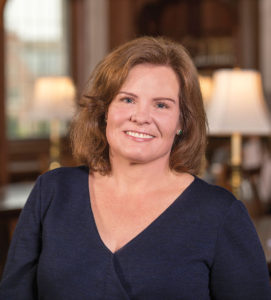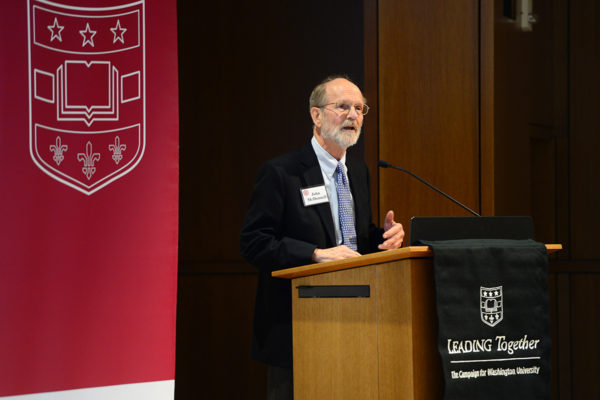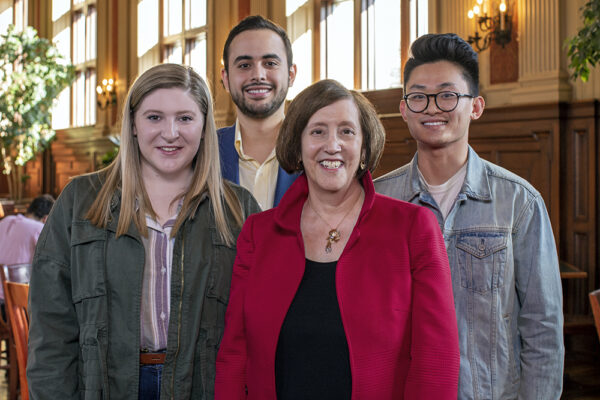Like many college students, Alicia McDonnell was interested in public service, but she was still unsure what her career path should be. After graduating with a degree in political science from the University of Rochester, she joined her older sister in Boston.

“I had no plan,” she says. “My mother suggested that I get some experience as a volunteer, so I opened up the Boston phone book and called the Suffolk County District Attorney’s Office. I asked if I could do an internship. I don’t think they had too many requests like that — they didn’t really know what to do with me!”
She was assigned to the White Collar Crime Unit as an investigator for Bob McKenna, one of three prosecutors in the unit. McKenna became her mentor, and he encouraged her to consider law school.
After a year, McDonnell was assigned to Dorchester, one of the most crime-ridden areas in Boston. “All the attorneys were kids right out of law school,” she says. “They let me help prepare for trials, interview witnesses, and see what it’s really like to be a lawyer. I was totally hooked.” She applied to law school a year later.
“I had the option of going to school in Boston at night and working during the day, but that seemed overwhelming. Fortunately, I also applied to Washington University School of Law. I was so grateful that they let me in, and I resolved to do my best so they wouldn’t regret their decision!”
A clear goal
“I wanted to become a prosecutor and go back to Boston,” she says. “Washington University Law did not emphasize criminal law, but the other law schools that admitted me simply prepared students to pass the bar exam. The School of Law trained us to think like lawyers. The approach was analytical and rigorous, and I had wonderful professors, like David Becker, who took a real interest in their students. It was wonderful preparation.”
The law school did not have a clinical program in prosecution at that time, so McDonnell did an internship in the U.S. Attorney’s Office. “They kept me in the library,” she recalls. In 2014, she made a generous gift to establish a Prosecution Law Clinic as part of the law school’s highly ranked Clinical Education Program.
The Prosecution Law Clinic works in partnership with the St. Louis Circuit Attorney’s Office to enable talented law students to gain hands-on experience. McDonnell says, “Students learn how to prepare a case, work with witnesses, introduce exhibits into evidence, and sort out the ethical issues. It doesn’t get more real than this — until students become attorneys themselves.” Her gift also established an endowment to provide summer stipends for second-year law students who want to work in federal, state or local prosecutors’ offices.
Nancy Staudt, the Howard & Caroline Cayne Professor of Law and dean of the School of Law, says, “Alicia McDonnell shares her passion and expertise to inspire outstanding young lawyers to consider careers in public service, and her great generosity helps to make that possible. She is a valued mentor and a wonderful colleague, and we are fortunate to count her among our most dedicated alumni.”
A passion for justice
“Prosecutors are a different breed,” McDonnell says. “They don’t do their work for the title, salary or prestige. They believe in public service and are passionate about seeking justice.”
“I have enormous respect for the people who dedicate themselves to safe and just communities. Our society needs the very best professionals in these fields.”
— Alicia McDonnell
She speaks from personal experience. After earning her law degree in 1995, McDonnell returned to Boston and practiced for 10 years as an assistant district attorney for Suffolk County and a city attorney for the Boston Police Department. She prosecuted tough cases related to firearms, narcotics, domestic violence and child abuse. As a supervising district attorney for Suffolk County, she supervised and trained assistant district attorneys, oversaw all prosecutions of cases in Dorchester Court, and maintained a caseload of high-priority and sensitive cases.
Now living in St. Louis, McDonnell takes an active interest in students and serves on the board of Girls, Inc. “I have enormous respect for the people who dedicate themselves to safe and just communities,” she says. “Our society needs the very best professionals in these fields.”
The Prosecution Law Clinic addresses a growing student interest in the criminal justice system. McDonnell is impressed with the caliber of students at the School of Law today. “They are very focused and mature, and have already done so much with their lives.”
A university citizen
McDonnell has received a Young Alumni Award from the School of Law and a Distinguished Alumni Award at Founders Day for her many contributions. In addition to serving on the law school’s national council and as programs chair for the Eliot Society, she is vice chair of scholarships and fellowships for Leading Together: The Campaign for Washington University.
“Today, many students would like to have careers in public service, but high student debt makes that difficult, if not impossible,” she says. “When they asked me to help raise money for scholarships, I said yes immediately. I knew this was something I could really get behind.”
She has supported scholarships at the School of Law since she graduated. “I want to help more young lawyers achieve their career goals while serving the public.” She also established the John McDonnell Scholarship in the School of Engineering & Applied Science in honor of her father, the retired chairman of the board of McDonnell Douglas Corporation and a life trustee of Washington University.
“Education is the key to a successful life,” Alicia McDonnell says. “Washington University is an amazing place, an amazing asset for St. Louis, and any company or institution that hires a Washington University graduate is fortunate. I am so grateful for the outstanding professional education I received at the School of Law, and I’m glad to help provide that opportunity for others.”
Chancellor Mark S. Wrighton says, “Alicia is a great citizen of Washington University. Her dedication and generosity are extraordinary. Her leadership has helped to galvanize support for scholarships in the campaign. By carrying on her family’s longstanding tradition of service to the university, she will have lasting impact on the leaders of tomorrow, and we are profoundly grateful for her loyal support.”
Susan Wooleyhan Caine is executive director of development communications in Alumni & Development Programs.


